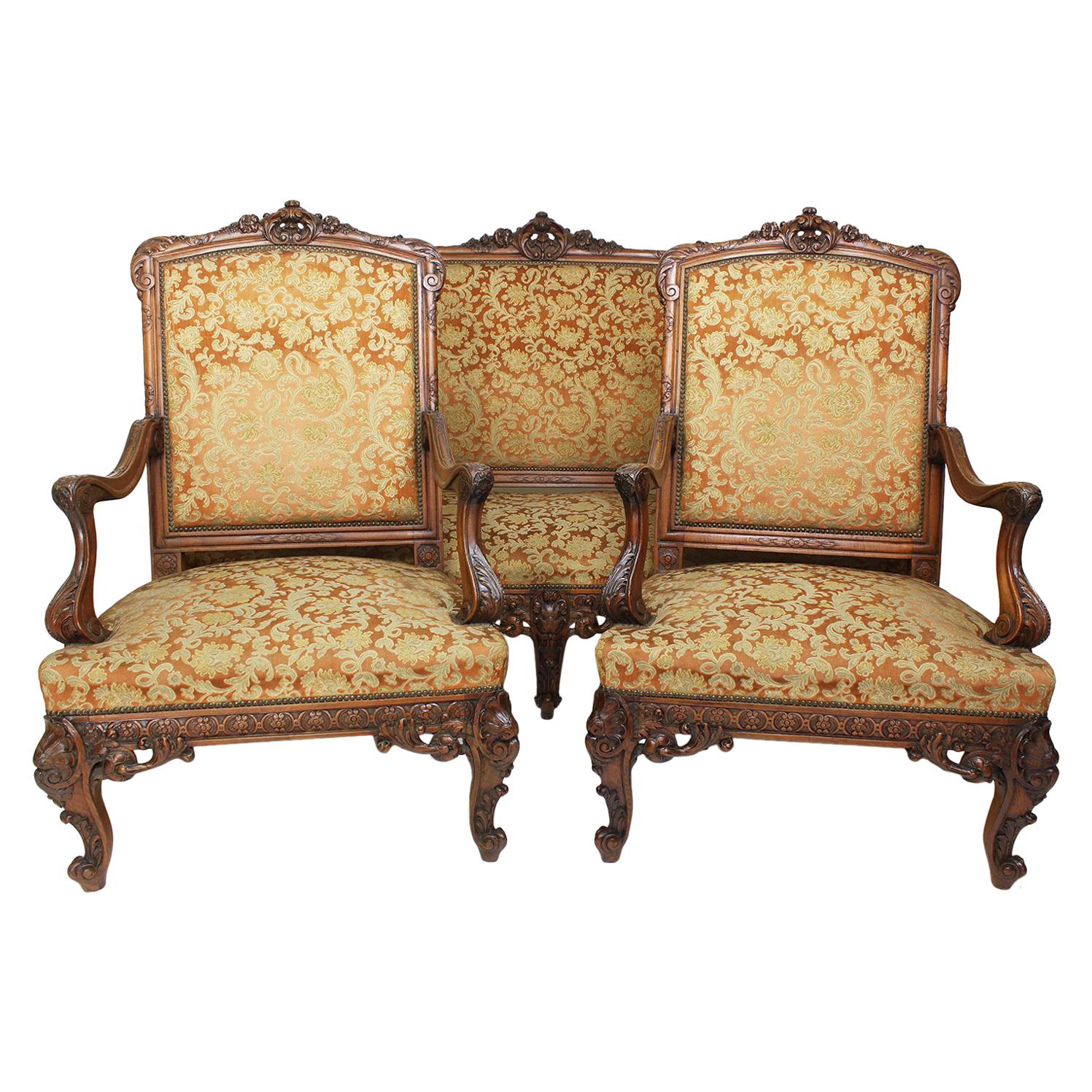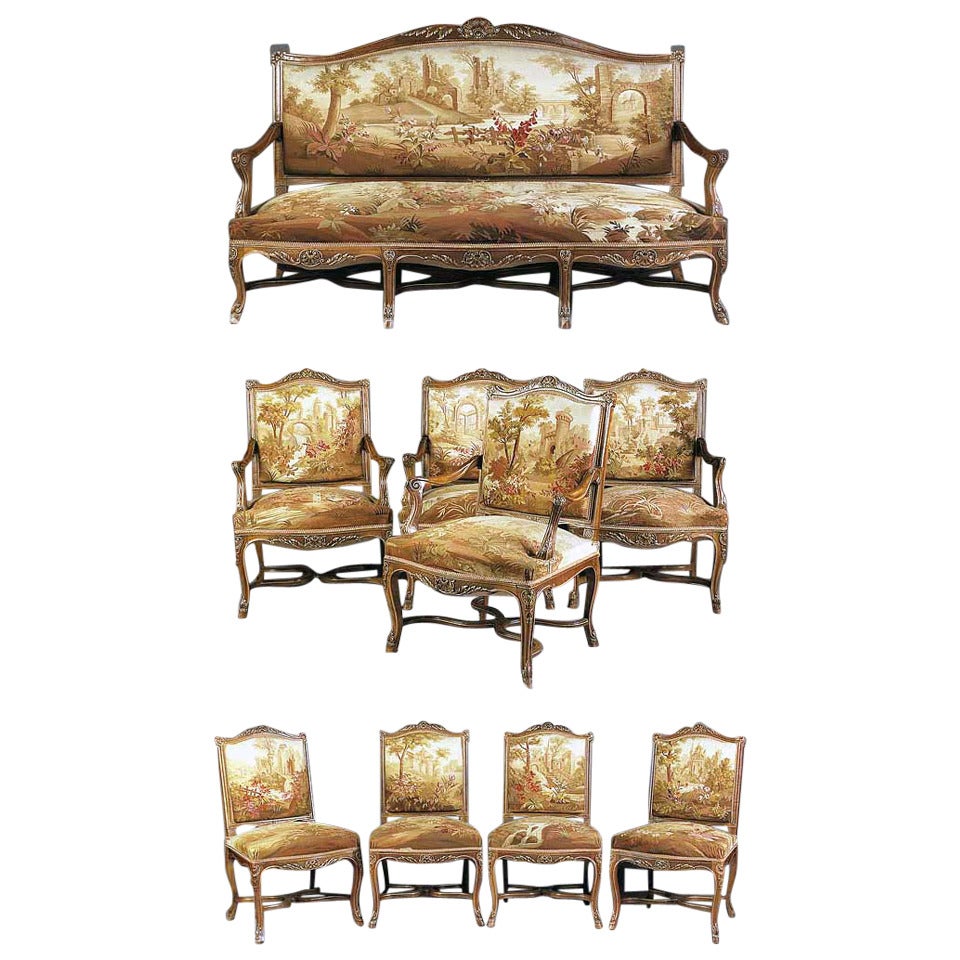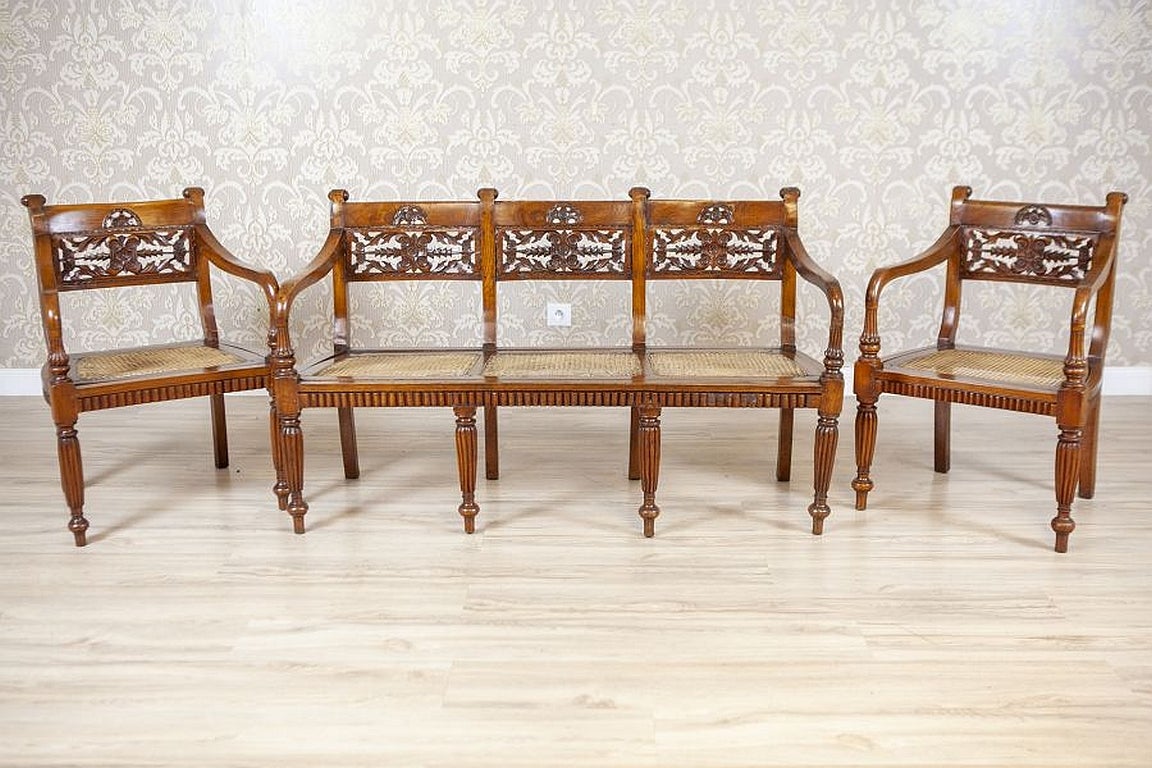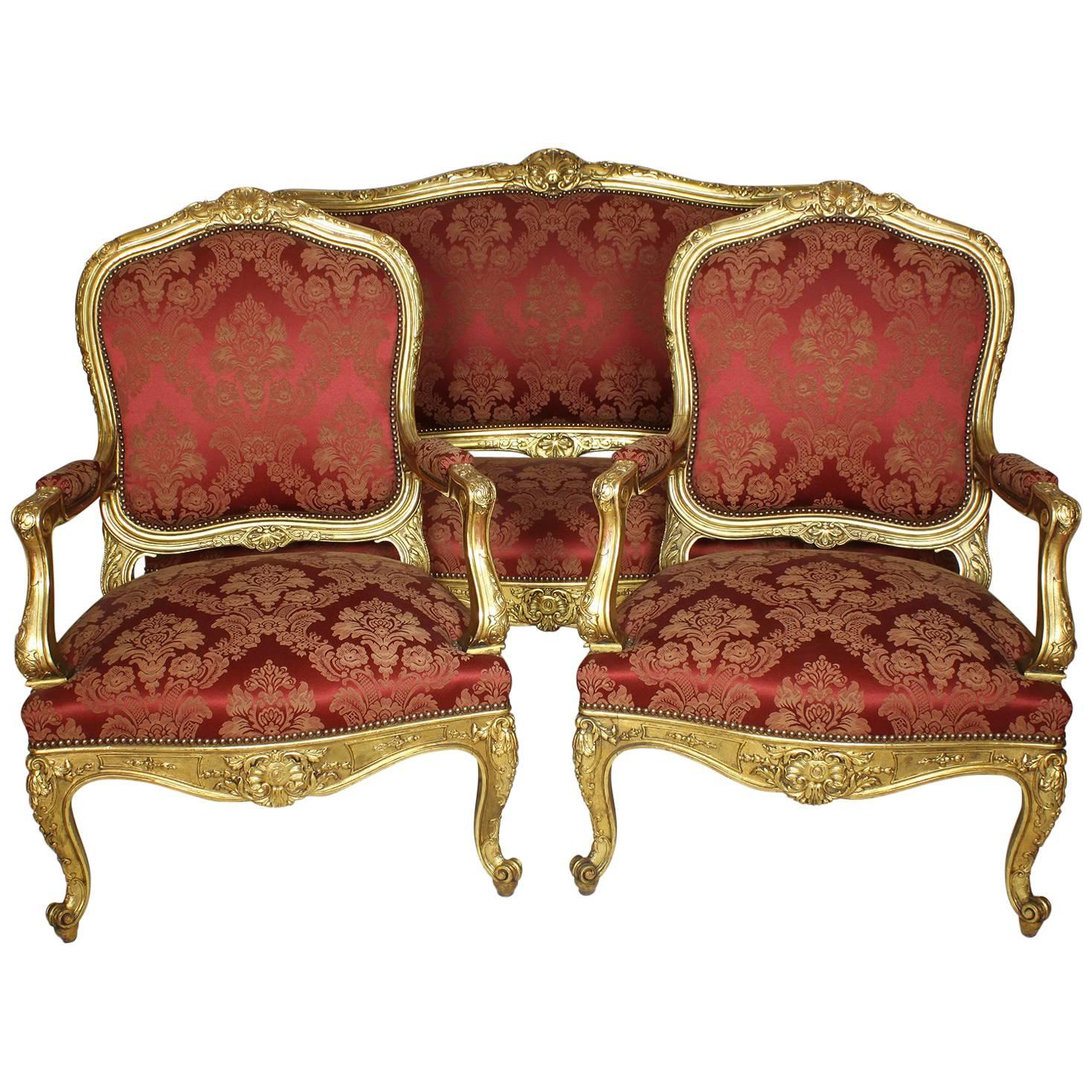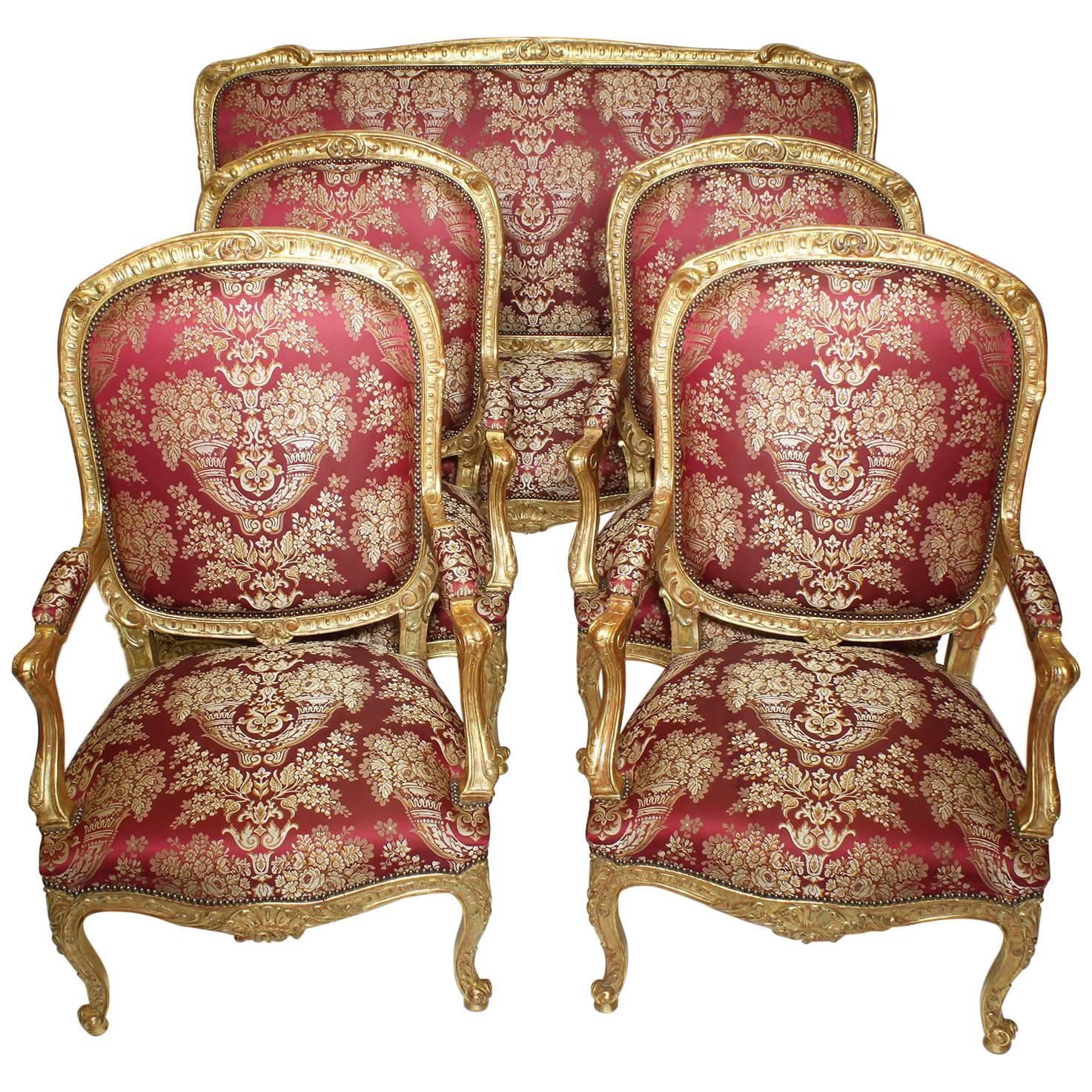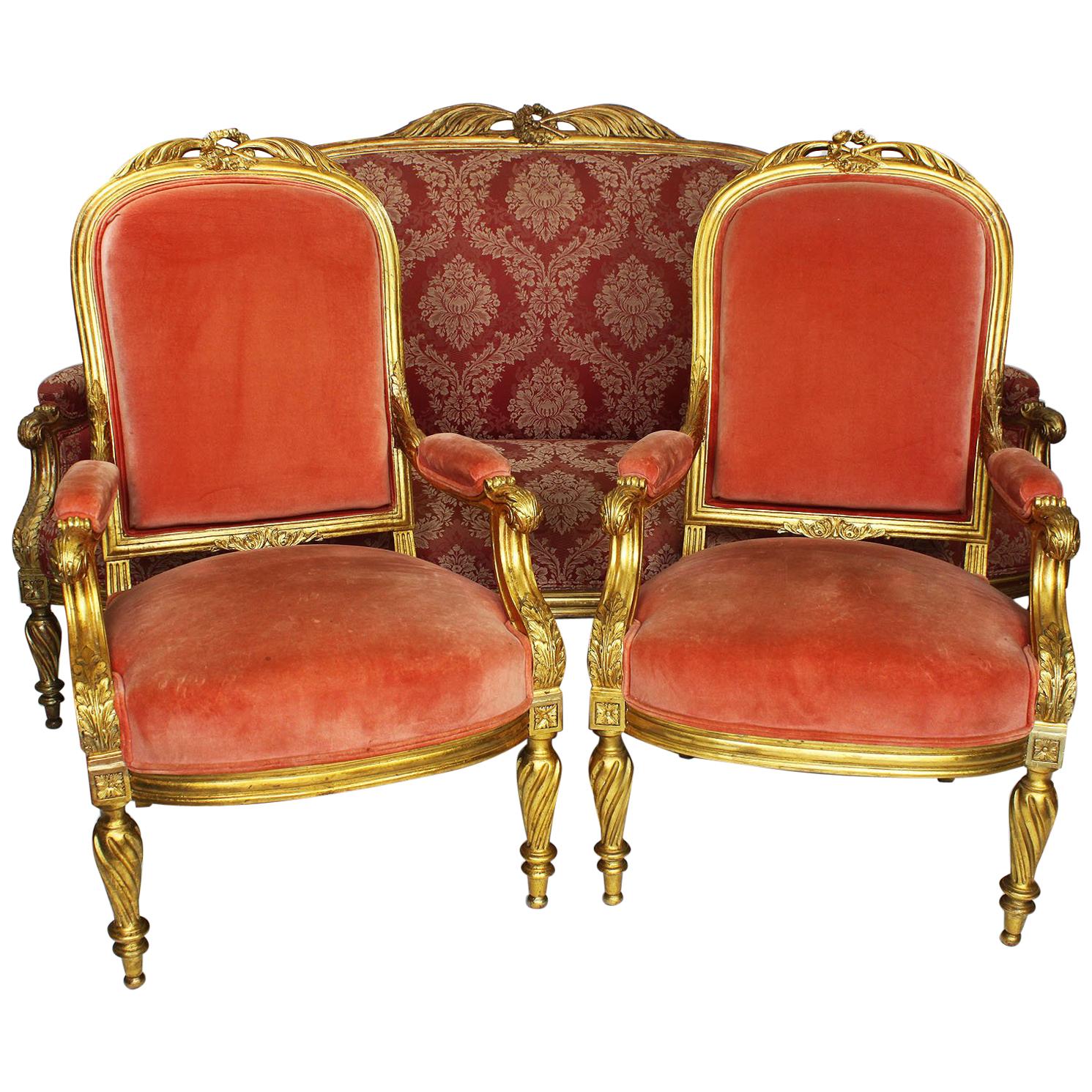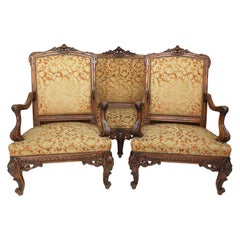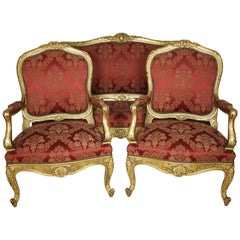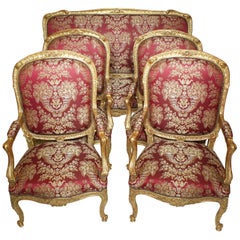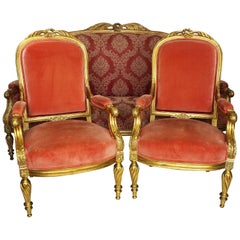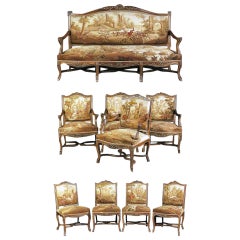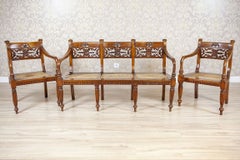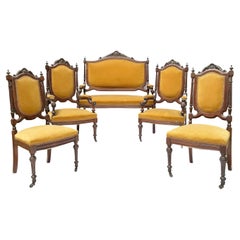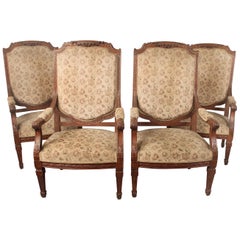Items Similar to An Anglo-Dutch 19th Century Walnut Carved 5 Piece Parlor Set, After Daniel Marot
Want more images or videos?
Request additional images or videos from the seller
1 of 11
An Anglo-Dutch 19th Century Walnut Carved 5 Piece Parlor Set, After Daniel Marot
About the Item
A Fine Anglo-Dutch 19th Century Baroque Style Ornately Carved Walnut Five Piece Parlor - Salon Suite, After Daniel Marot (French-Dutch, 1661–1752); comprising of a settee, two armchairs and two side chairs. The intricately pierced high-backs carved frames with scrolled and floral designs, curved armrests and cabriolet conjoined legs. Circa: 1890.
Measures: Settee height: 54 3/4 inches (139.1 cm)
Settee width: 70 3/4 inches (179.7 cm)
Settee depth: 24 inches (61 cm)
Armchairs Height: 52 inches (132.1 cm)
Armchairs Width: 28 inches (71.1 cm)
Armchairs Depth: 21 1/2 inches (54.6 cm)
Side chairs Height: 50 inches (127 cm)
Side chairs Width: 21 1/2 inches (54.6 cm)
Side chairs Depth: 20 1/2 inches (52.1 cm)
Seat height: 20 3/8 inches (51.8 cm).
Daniel Marot or Daniel Marot the Elder (1661–1752) was a French-born Dutch architect, furniture designer and engraver at the forefront of the classicizing Late Baroque Louis XIV style. He worked for a long time in England and the Dutch Republic, where he was naturalised in 1709.
Born in Paris, he was a pupil of Jean Le Pautre and the son of Jean Marot, who was also an architect and engraver. Marot was working independently as an engraver from an early age, making engravings of designs by Jean Bérain, one of Louis XIV's official designers at the Manufacture des Gobelins, where far more than tapestry was being produced. The family were Huguenots and were part of the wave of émigrés who left France in the year of the Edict of Fontainebleau and Revocation of the Edict of Nantes (1685) to settle in Holland. Daniel Marot brought the fully developed court style of Louis XIV to Holland, and later to London. In the end, the English style which is loosely called "William and Mary" owed much to his manner.
In the Dutch Republic, Marot was employed by the Stadthouder, who later became William III of England; in particular, he is associated with designing interiors in the palace of Het Loo, from 1684 on. Though his name cannot be attached to any English building (and he does not have an entry in Howard Colvin's exhaustive Dictionary of British Architects) we know from his own engraving that he designed the great hall of audience for the States-General at the Hague. He also decorated many Dutch country-houses, introducing the “salon” and popularizing ornamented ceilings in The United Provinces/ Netherlands.
State bed, designed by Daniel Marot, engraving, ca 1702
In 1694, he traveled with William to London, where he was appointed one of his architects and Master of Works. In England his activities appear to have been concentrated at Hampton Court Palace, where he designed the garden parterres, which were swept away in the following generation and have been restored at the end of the 20th century. His designs for the Great Fountain Garden survive. Much of the furniture, especially the mirrors, guéridons and state beds, in the new State Rooms readied for William at Hampton Court bears unmistakable traces of his authorship; the tall and monumental embroidered state beds, with their plumes of ostrich feathers, their elaborate valances and cantonnieres agree very closely with his later published designs.
After William's death Marot returned to Holland where he lived at the Noordeinde 164 in The Hague from 1720 until his death in 1752. The house with his salon, kitchen, hallway and possibly some of his ceilings still exists.
We owe much of our knowledge of his work to the folio volume of his furniture designs published at Amsterdam in 1712. Not surprisingly the designs show strong French and Dutch influences; what reads as their "English" look is more probably the result of Marot's court style on other London designers.
Marot was a nephew of Pierre Gole as he was the son of Gole's sister-in-law. He married Gole's niece.
- Dimensions:Height: 57.75 in (146.69 cm)Width: 70.75 in (179.71 cm)Depth: 24 in (60.96 cm)Seat Height: 20.38 in (51.77 cm)
- Sold As:Set of 5
- Style:Baroque Revival (In the Style Of)
- Materials and Techniques:
- Place of Origin:
- Period:
- Date of Manufacture:Circa 1890
- Condition:Wear consistent with age and use. Minor fading. An impressive living-room set. The fabric is worn and damaged and should be replaced. The frame is structurally sound with some wear, scratches and joint exposure consistent with age and use. The images depict the actual condition accurately.
- Seller Location:Los Angeles, CA
- Reference Number:Seller: Ref.: A2248 - Lot 91111stDibs: LU179629099423
About the Seller
5.0
Vetted Professional Seller
Every seller passes strict standards for authenticity and reliability
Established in 1982
1stDibs seller since 2016
130 sales on 1stDibs
Typical response time: <1 hour
- ShippingRetrieving quote...Shipping from: Los Angeles, CA
- Return Policy
Authenticity Guarantee
In the unlikely event there’s an issue with an item’s authenticity, contact us within 1 year for a full refund. DetailsMoney-Back Guarantee
If your item is not as described, is damaged in transit, or does not arrive, contact us within 7 days for a full refund. Details24-Hour Cancellation
You have a 24-hour grace period in which to reconsider your purchase, with no questions asked.Vetted Professional Sellers
Our world-class sellers must adhere to strict standards for service and quality, maintaining the integrity of our listings.Price-Match Guarantee
If you find that a seller listed the same item for a lower price elsewhere, we’ll match it.Trusted Global Delivery
Our best-in-class carrier network provides specialized shipping options worldwide, including custom delivery.More From This Seller
View AllFine French 19th Century Louis XV Style Carved Walnut Three-Piece Salon Suite
Located in Los Angeles, CA
A fine and large French 19th century Louis XV style carved walnut three-piece salon suite. The high back intricately carved frames with floral and wreath design, comprising of a thre...
Category
Antique Late 19th Century French Louis XV Living Room Sets
Materials
Fabric, Walnut
$24,950 Sale Price / set
27% Off
Palatial 19th Century Louis XV Style Giltwood Carved Three-Piece Salon Suite
Located in Los Angeles, CA
A fine French 19th century Louis XV style giltwood carved three piece salon suite, comprising of a canapé (Settee) and two fauteuils à la reine...
Category
Antique 19th Century French Louis XV Living Room Sets
Materials
Fabric, Wood
$27,450 Sale Price / set
20% Off
Palatial 19th Century Louis XV Style Giltwood Carved Five-Piece Salon Suite
Located in Los Angeles, CA
A very fine and palatial French 19th century Louis XV style giltwood carved five-piece salon suite, comprising of a canapé (Settee) and four fauteuils à la reine (Armchairs), all of ...
Category
Antique 19th Century French Louis XV Living Room Sets
Materials
Fabric, Wood
$28,750 Sale Price / set
39% Off
French Louis XVI Style 19th Century Giltwood Carved Three-Piece Salon Suite
Located in Los Angeles, CA
A fine French Louis XVI style 19th century giltwood carved three-piece salon suite, comprising of a three-corps settee and...
Category
Antique Late 19th Century French Louis XV Living Room Sets
Materials
Fabric, Giltwood
$8,950 Sale Price / set
39% Off
French 19th-20th Century Louis XV Style Giltwood Carved Five-Piece Salon Suite
Located in Los Angeles, CA
An Impressive French 19th-20th century Louis XVI style five-piece giltwood carved salon or parlor suite, comprising of a canapé (settee) and four fauteuils à la reine (Armchairs) uph...
Category
Antique Early 1900s French Louis XVI Living Room Sets
Materials
Damask, Giltwood
$21,985 Sale Price / set
41% Off
Fine French 19th Century Louis XVI Style Giltwood Carved Five-Piece Salon Suite
Located in Los Angeles, CA
A very fine French 19th century Louis XVI style giltwood carved five-piece salon suite, comprising of a canapé and four fauteuils, all with recent upholstery. The finely carved frame...
Category
Antique Late 19th Century French Louis XV Living Room Sets
Materials
Fabric, Giltwood
$22,850 Sale Price / set
48% Off
You May Also Like
Nine-Piece 19th Century Parcel Gilt Carved Aubusson Tapestry Parlor Set
Located in Long Island City, NY
A fantastic late 19th century nine-piece Louis XV style parcel-gilt carved walnut and Aubusson Tapestry Parlor set.
Consisting of four side chairs, four armchairs and a settee, ea...
Category
Antique 19th Century French Belle Époque Chairs
Materials
Tapestry, Wood
19th Century Rosewood Parlor Set with Carved Backrests
Located in Opole, PL
19th Century Rosewood Parlor Set with Carved Backrests
We present you a set composed of a three-seat bench and two armchairs.
All the furniture is...
Category
Antique Mid-19th Century European Benches
Materials
Rosewood
$2,275 Sale Price / set
20% Off
Magnificent 19th Century Victorian Parlor Set
Located in Rio De Janeiro, BR
This remarkable 19th-century 5-piece parlor set is a stunning example of the Victorian era’s craftsmanship and elegance. Comprising a grand settee and four exquisite chairs, includin...
Category
Antique 1860s British Victorian Living Room Sets
Materials
Wood
$5,800 / set
Impressive Set of Four Late 19th Century Louis XVI Style Carved Armchairs
Located in Long Island City, NY
An Impressive Set of Four Late 19th Century Louis XVI Style Carved Wood Armchairs
The oversized chairs with high backs and wide seats, hand carved strong and sturdy floral designed...
Category
Antique Late 19th Century French Belle Époque Armchairs
Materials
Fabric, Wood
Extraordinary Italian Eleven Piece Gilt Salon Living Room Suite, 19th Century
Located in Rome, IT
This magnificent and finely carved suite comprising of one sofa, two armchairs, two single chairs, Two window benches and four benches with original gildi...
Category
Antique Late 19th Century Italian Louis XV Living Room Sets
Materials
Giltwood
Armchair, Walnut, Carved, Upholstered, Daniel Marot, Flemish, 17 Century Baroque
Located in BUNGAY, SUFFOLK
A fine, large, late 17th century, Flemish, open armchair in the style of Daniel Marot with an upholstered seat
This fine, armchair is an, unusually, large size and the carving is of exceptional quality reflecting the status of the owner it was made for. It is sturdy and in usable condition. Chairs of this type, with tall, intricately carved backs, were placed in rows against a wall forming part of the decoration of a room. The carving of the back of this chair is French in style and was based on decorative prints by Daniël Marot
The cresting carved with a profusion of acanthus leaf scrolls. The back with fine, pierced carving. The mid-section with a central flowerhead with scrolled shields above and below ornamented with flowerheads acanthus leaf crestings. Two pairs of carved ‘S’ scrolls ornamented with acanthus leaves either side. The tapering turned sections surmounted by ionic capitals and supporting back of the scroll arms carved with acanthus leaf ornament. The front arms supported by baluster and tapering turned sections ornamented with acanthus leaf carving. The legs joined by a shaped ‘H’ stretcher with central finial, on bun feet. The upholstered seat reupholstered in a bargello woven in tones of blue, green, red and gold faced with braid and brass studwork.
The back of the chair has an incredible, 19th century, oak support from the cresting to halfway down the back, which has been beautifully carved to conform with the open sections of the back, and two braces down the length of the back. There are also two oak supports behind seat blocks at the top of the legs. These repairs are sensitive to the model of chair and have become part of its character and features in their own right and they are very interesting from a conservation history perspective. There are two old repairs to a small break in the cresting on the right hand side and the hairline cracks are visible, an old repair to a small break in the top right of the central splat with a small piece added and a visible hairline crack. The right side of the back has noticeable worm damage on the right seat block which is probably the root cause of the break on the block on this side from impact as the chair probably fell backwards at some point and either onto its right side or it hit something on that side and the block weakened by worm gave way as the damage to the chair is localised on the far right side. Because the backs are high on these Daniel Marot chairs they are top heavy and invariably do have damage to the backs and crestings from impact damage so this is not unusual. The right block has been repaired thoroughly and is stable and there is no live worm in the chair. It would be possible to disguise these repairs but I have left them as they are consistent with the 19th century date of the supports and conform with museum standards. A full set of photographs...
Category
Antique 1690s Dutch Baroque Armchairs
Materials
Walnut
Recently Viewed
View AllMore Ways To Browse
Fine Set Of 3
Engravings Set
Engravings Set 4
Antique Italian Settee
Elder Chair
2 Piece Hand Carved Chair
Anglo Dutch Furniture
Anglo Dutch
19th Century Italian Settee
5 Piece Settee
Country French Settee
French Country Settees
Howard Pierce
William And Mary Revival
5 Leg Settee
Antique French Country Settee
Italian Baroque 3 Piece Suite
20 Century Italian Louis Revival
